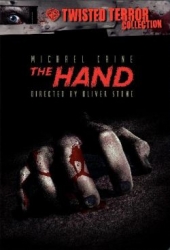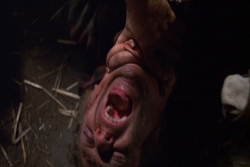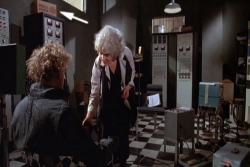
note: this article was written for the final girl film club. see more reviews of “the hand” there… as well as all the other fantabulous-ness that is stacie’s final girl blog.
corey’s review…
sometimes you know what kind of movie you’re about to watch just from the title. this is particularly true of two word, two syllable titles that begin with “the.” the blob, the stuff, the thing, the fog, etc. this month’s filim club entry, the hand, is no exception. however, my faith in this rule was shaken when i saw oliver stone’s name in the credits as the screenwriter and director. wouldn’t it be just like stone to name a movie the hand, open with lots of close-ups of a man’s fingers and gold ring… and then make the film actually be about a killer foot? alas, oliver had nothing quite so clever in mind and, as expected, this does end up being a film largely about a disembodied hand with a nasty temper.
the movie’s tagline?
It lives. It crawls. And suddenly, it kills.
the imdb summary:
Jon Lansdale (Michael Caine) is a comic book artist who loses his right hand in a car accident. The hand was not found at the scene of the accident, but it soon returns by itself to follow Jon around, and murder those who anger him.

i can see why (given her profession in the comic industry) stacie chose this film for the final girl film club and, at first glance, this seems like its going to be a really groovy horror film about a killer hand. as the film progresses though, it becomes clear that there is a disconnect between what the film is and what it wants to be. given this is early in stone’s career, it seems he lacked the creative control he would eventually gain over his own films. here its obvious he was contracted to make a horror film about a killer hand… but it doesn’t feel like oliver really likes horror all that much and has little fun with the premise. instead he spends far too much time on marital disputes, dream sequences and homages to other psychological thrillers with far more substance (polanski’s repulsion and the tenant being primary influences).
not that making this a psychological thriller is necessarily a bad thing. a film about a man who loses his hand and then transfers all his anger and repressed emotions into the murderous appendage is a fascinating idea and is ultimately what this film becomes. the problem is that the film fails at the most basic element of what would make such a story work — it doesn’t make you afraid of the hand. any film called the hand should either contain (or lead the audience to believe it contains) a killer hand. and while you do occasionally see a murderous hand, from the very beginning it’s clear that the killer appendage is only in jon’s imagination. this leaves little ambiguity in the story and little to be frightened of… what we’re left watching is an hour and a half of a man going crazy until he resorts to violence. the reasons for his insanity don’t even seem to correlate all that heavily with the loss of his hand, as it seems he would have gone just as crazy whether he lost it or not because the precipitating event seems to be losing his wife — not his hand. for the story to really work as a horror film, it’d need to be unclear whether the hand was real or imaginary… and then perhaps reveal which it was at the end after leading the audience to believe the opposite. as it stands, the first time you see jon beginning to think his hand is running around by itself, you instantly know he’s nuts — and all that’s left is over an hour of watching him confirm it.

that isn’t to say there isn’t anything good here. the acting is great (no one can sell getting choked by a rubber hand like michael caine), the metaphoric imagery is often intriguing (e.g., when jon’ first puts on his prosthetic hand/glove, it clenches in a vice-like manner, indicating jon’s hidden emotions), and a lot of the shots of the imaginary hand are well-done and quite a few were later stolen for use in such killer-hand classics as evil dead 2 and waxworks 2. seeing the procedures and steps one goes through after suffering such a loss is interesting and the characters are well-written… but this isn’t enough to save it from becoming dull and predictable, particularly in the final act. this is topped off with a ridiculous finale where we see jon in a psychological laboratory (complete with scalp electrodes) being talked to by a rather sadistic psychiatrist (who, if you look closely, appears to keep cases of popov vodka in the patient testing room). predictably, the hand goes after another victim and the film closes on a 70s era television freeze-frame of michael caine looking nuts… which is something we knew all along and hardly need driven into our minds by a frozen image.
perhaps its just me or my expectations… maybe i just wanted a campy killer hand movie and thus couldn’t properly appreciate what i was given. i dunno. i do think this film would have fared better if it’d just embraced its premise and become a true horror film… or if it’d abandoned that idea altogether and gone the straight psychological thriller route. as it is, it’s a weird hybrid that combines the least effective aspects of both genres into a very ambitious, but ultimately ineffective film.
below i’ve included the scene where michael caine actually loses the hand in question. it’s actually quite gory, which is out-of-character for the rest of the film… but the improbability and over-the-top bloodiness of it actually make this the film’s best scene.
jon’s review…
Don’t let the fact that Oliver Stone directed The Hand fool you. This film does not explore the horrors of Vietnam, the inhumanity of the military industrial complex, nor the conspiracies within American media and politics. The Hand, which Stone directed early in his career, departs from his standard fare and instead explores such rich philosophical concepts as the relation between mind and body and the nature of human will.
Michael Cain delivers a truly brilliant performance as John Landsdale, a successful comic book artist whose artistic ambitions and stormy disposition have left him estranged from his wife. However, his ambitions are frustrated and his career is derailed when he loses his right hand in a horrific car accident, which sends him on a psychological downward spiral reminiscent of both The Shining and Psycho.
There is, of course, a long-standing literary and cinematic tradition of the severed hand motif. For instance, in Shakespeare’s Titus Andronicus , the venerable bard has one of the play’s central characters appear on stage with her severed hands in her mouth. In what might be a prototype for modern zombie films, Shakespeare wants to impress upon his audience that death and tragedy have a macabre way re-animating in the imagination and on the stage. In The Evil Dead II, Ash famously engages in an epic battle with his own severed and demonically possessed hand.
What all such motifs tend to have in common is the link between hands and human will. In Stone’s The Hand, all of John’s ambitions as well as insecurities take on a symbolic life of their own as he imagines that his hand carries out his deepest, most depraved desires. Part of the film’s fun is the way that it sometimes playfully suggests that the hand is, in fact, an Adam’s Family style monster, but never truly departs from the idea that it’s all part of John’s complex psychosis. The film is also impressive in the way it always avoids degrading into outright parody and camp. In fact, the film is often an intimate portrait of grief, loss, and the fragile line between our bodies and our identity. This is especially moving when John searches for his missing hand while worrying that it’s already decayed to mere bone. This film will disappoint if you’re expecting b-move camp, blood and gore, or typical Oliver Stone paranoia. Instead, this film is an intelligent, if sometimes overly ponderous, meditation on our deepest human frailties.










5 Responses to Review of THE HAND (1981)
Subscribe Without Commenting